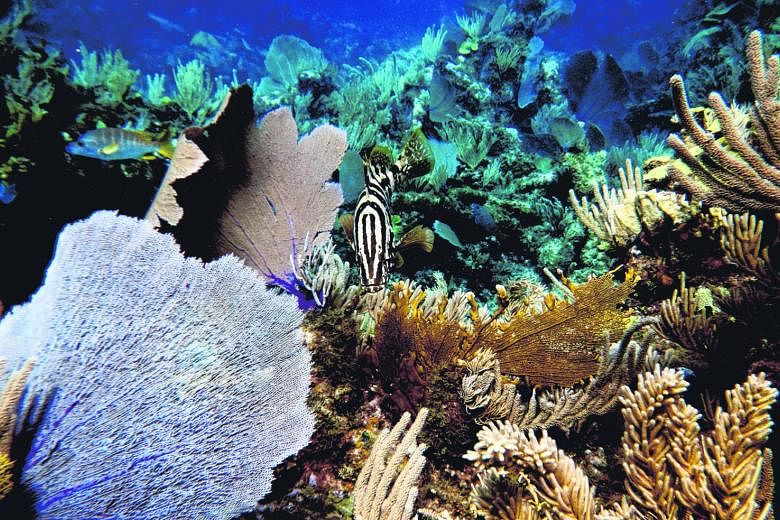Lack of fish urine affecting coral reefs
Coral reefs where fishing occurs are suffering because there is not enough fish urine.
A new study published in Nature Communications found that in such areas, nearly half of key nutrients - including phosphorus and nitrogen - are absent from the ecosystem.
The main reason? Fewer large-bodied and predatory fish to urinate nutrients into the water, the study found. When fish urinate, they release phosphorus into the water. Along with nitrogen excreted as ammonia through the gills of fish, it is crucial to the survival and growth of coral reefs.
"Part of the reason coral reefs work is that animals play a big role in moving nutrients around," said lead author Jacob Allgeier, a post-doctoral researcher at the University of Washington's School of Aquatic and Fishery Sciences. "Fish hold a large proportion, if not most, of the nutrients in a coral reef in their tissue, and they're also in charge of recycling them. If you take the big fish out, you're removing all of those nutrients from the ecosystem."
The researchers surveyed 143 fish species at 110 sites across 43 Caribbean coral reefs that vary in the amount of fishing pressure sustained - ranging from marine preserves that ban all fishing to heavily fished reefs where large predatory fish are almost gone.
They found that reefs with more large predatory fish had healthy levels of nutrients, while reefs depleted of large fish had nearly 50 per cent fewer nutrients essential to their survival. They determined that the large reductions in fish urine were driven by the reduction of large-bodied fish and predatory fish - such as grouper, snapper or barracuda - that occurs through selective fishing practices.
"Simply stated, fish biomass in coral reefs is being reduced by fishing pressure. If biomass is shrinking, there are fewer fish to pee," Dr Allgeier said.
The researchers expect that this relationship between fish and coral exists in other reefs around the world. Dr Allgeier is now working with researchers at the University of California, Santa Barbara, to collect data on fish urine in tropical Pacific Ocean reefs next.
Human-odour mozzie trap helps fight malaria
Dutch and Kenyan scientists have designed a unique mosquito trap that uses human odour to attract the malaria-carrying insects, helping cut the number of cases dramatically, researchers said.
A three-year study in Kenya found that the special traps, baited with synthetic smell, helped to catch 70 per cent of the local malaria mosquito population and led to a 30 per cent drop in cases in households using the devices.
Published recently in The Lancet, the research was carried out on the Kenyan island of Rusinga, with the participation of all 25,000 residents.
"The odour-baited trap may also offer a solution to diseases like dengue fever and the Zika virus," Wageningen University in the Netherlands, which led the research, said in a statement.
Both dengue and Zika are caused by parasites carried by a different kind of mosquito from the malaria-bearing one, but which is also attracted by human smell. The trap also reduces the need to rely on pesticides to control mosquitoes, which are becoming more resistant to such chemicals. Using pesticides is dangerous to agriculture.
The solar-powered traps were laced with human pong and placed either outside or inside homes on the island in Lake Victoria. Mosquito nets and anti-malarial drugs were also used to combat the disease.
Since the traps need electricity to work, the researchers installed solar panels on the houses as there is no electricity grid on the island.
In an added benefit for the local people, the panels can also power two light bulbs and charge mobile phones.
"Every minute, a child dies of malaria. This disease costs Africa (billions of dollars) a year" in healthcare costs and lost production, the Dutch university said.
Malaria is caused by parasites transmitted to people through the bites of infected female mosquitoes. There is currently no vaccine and about 438,000 people died last year from the disease, according to the World Health Organisation.
AGENCE FRANCE-PRESSE
Do canines prefer praise or food?
Given the choice, many dogs prefer praise from their owners over food, suggests a new study published in the journal Social Cognitive And Affective Neuroscience.
The study is one of the first to combine brain-imaging data with behavioural experiments to explore canine reward preferences and was conducted by researchers from Emory University in the United States.
For the experiment, the researchers began by training the dogs to associate three different objects with different outcomes. A pink toy truck signalled a food reward; a blue toy knight signalled verbal praise from the owner; and a hairbrush signalled no reward, to serve as a control.
The dogs were then tested on the three objects while in a functional magnetic resonance imaging machine. Each dog underwent 32 trials for each of the three objects as its neural activity was recorded.
All of the dogs showed a stronger neural activation for the reward stimuli compared with the stimulus that signalled no reward. The dogs then underwent a behavioural experiment. Each dog was familiarised with a room that contained a simple Y-shape maze: One path of the maze led to a bowl of food and the other path to the dog's owner who, if it went to, would praise it.
Most of the dogs alternated between food and owner, but those with the strongest neural response to praise chose to go to their owners 80 per cent to 90 per cent of the time. The experiments lay the groundwork for asking more complicated questions about the canine experience of the world. The researchers are now exploring the ability of dogs to process and understand human language.
Compiled by Samantha Boh


